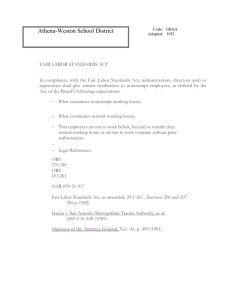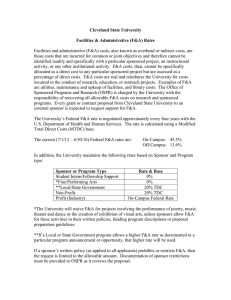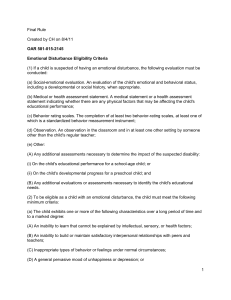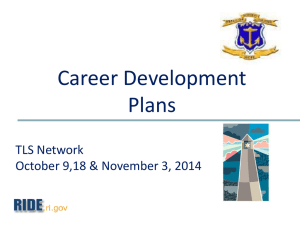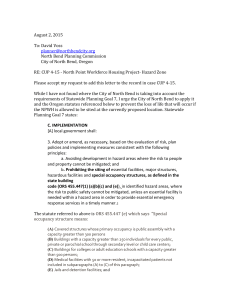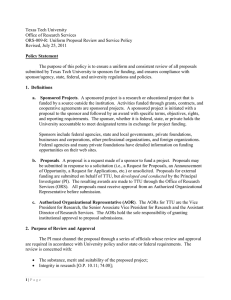ORS Strategic Plan MISSION STATEMENT
advertisement
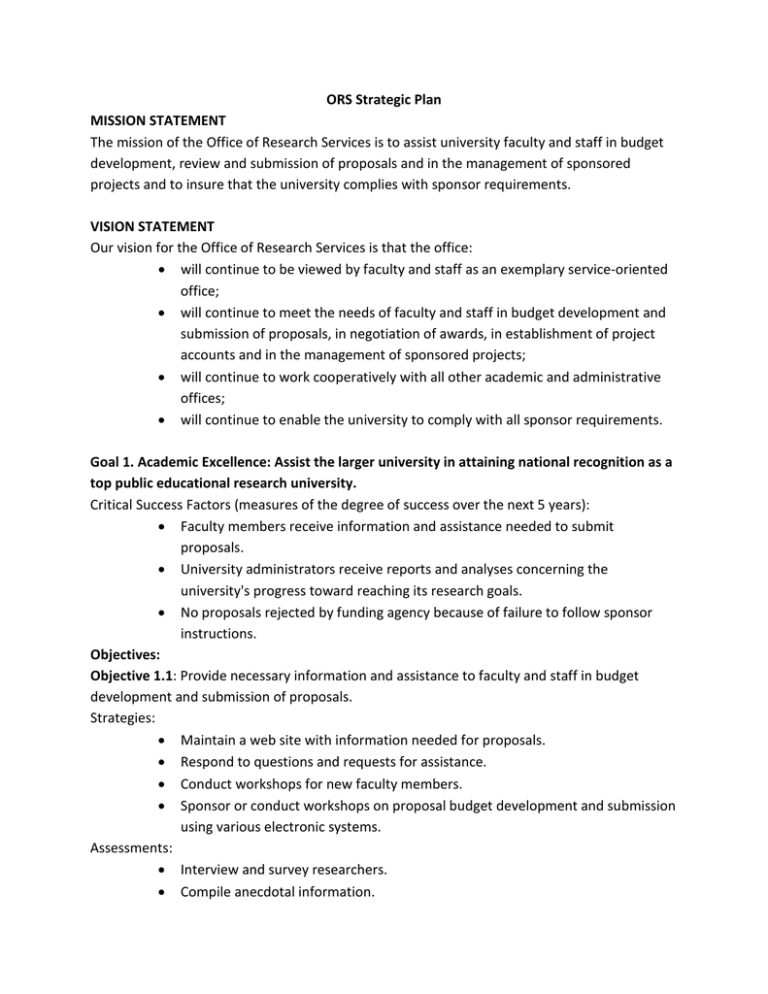
ORS Strategic Plan MISSION STATEMENT The mission of the Office of Research Services is to assist university faculty and staff in budget development, review and submission of proposals and in the management of sponsored projects and to insure that the university complies with sponsor requirements. VISION STATEMENT Our vision for the Office of Research Services is that the office: • will continue to be viewed by faculty and staff as an exemplary service-oriented office; • will continue to meet the needs of faculty and staff in budget development and submission of proposals, in negotiation of awards, in establishment of project accounts and in the management of sponsored projects; • will continue to work cooperatively with all other academic and administrative offices; • will continue to enable the university to comply with all sponsor requirements. Goal 1. Academic Excellence: Assist the larger university in attaining national recognition as a top public educational research university. Critical Success Factors (measures of the degree of success over the next 5 years): • Faculty members receive information and assistance needed to submit proposals. • University administrators receive reports and analyses concerning the university's progress toward reaching its research goals. • No proposals rejected by funding agency because of failure to follow sponsor instructions. Objectives: Objective 1.1: Provide necessary information and assistance to faculty and staff in budget development and submission of proposals. Strategies: • Maintain a web site with information needed for proposals. • Respond to questions and requests for assistance. • Conduct workshops for new faculty members. • Sponsor or conduct workshops on proposal budget development and submission using various electronic systems. Assessments: • Interview and survey researchers. • Compile anecdotal information. Objective 1.2: Ensure that proposals are submitted by funding agency deadlines. Strategies: • Encourage researchers to contact ORS early in process. • Within the office, continue to give top priority to submission of proposals. Assessment: • Monitor proposal submissions. Objective 1.3: Ensure that proposals are consistent with sponsor requirements and university policies. Strategy: • Review proposals and work with researchers to resolve any issues. Assessment: • Monitor proposal submissions. Objective 1.4: Maintain records and provide reports of proposal and award activity. Strategies: • Identify peer research institutions. • Track the university's progress in reaching its research goals. • Provide reports and analyses to university administrators, both routinely and on request. • Work with Administrative Information Systems to develop and implement webbased reporting of proposals and awards. Assessment: • Reports provided. Goal 2. Engagement: Assist faculty, staff and other university offices in building community connections and creating economic development programs. Critical Success Factors (measures of the degree of success over the next 5 years): • Evidence of faculty and staff satisfaction with ORS response to requests for assistance with community projects. • Evidence of cooperation with Office of Technology Commercialization, the Economic Development Center and the Small Business Development Center. Objectives: Objective 2.1: Assist in building community connections by supporting faculty and staff members who are engaged in community projects. Strategy: • Respond to requests for assistance. Assessments: • Interview and survey researchers. • Compile anecdotal information. Objective 2.2: Assist the Office of Technology Commercialization, the Economic Development Center and the Small Business Development Center in administering externally funded economic development projects. Strategies: • Develop sponsored project agreements and subcontracts as needed. • Confer with Office of Technology Commercialization on agreements involving both research sponsorship and intellectual property. Assessment: • Survey appropriate researchers and administrators. Goal 3. Technology: Appropriately utilize technology in the administration of research and sponsored projects. Critical Success Factors (measures of the degree of success over the next 5 years): • Implementation of electronic research administration on a schedule consistent with sponsor needs and directions. • Needs of research and sponsored projects are accommodated in university computer-based systems. • Implementation of web-based system for reporting proposals and awards. Objectives: Objective 3.1: Ensure that ORS has adequate software, hardware and technical support to implement electronic research administration. Strategies: • Maintain up-to-date knowledge of sponsor requirements concerning electronic communications and transactions. • Continually review ORS software and hardware in light of sponsor requirements. • Request funds for equipment and personnel as needed. Assessment: • Monitor ability to meet sponsor requirements. Objective 3.2: Ensure that ORS staff is adequately trained to implement electronic research administration. Strategies: • Send staff members to national and regional workshops and training programs. • Encourage staff members to attend university-provided training as appropriate. • Conduct in-house training sessions. Assessment: • Monitor staff members’ ability to use electronic research administration tools. Objective 3.3: Ensure that information and training on electronic research administration, including accessing program information on-line, is made available to faculty members and support staff. Strategies: • Provide information on web site and through other means. • Conduct workshops. Assessments: • Survey faculty and staff. • Evaluate workshops. Objective 3.4: Ensure that all university e-business processes adequately support research and externally funded projects. Strategies: • Serve on e-business task forces. • Provide advice on e-business developments. • Participate in pilot tests. Assessment: • Evaluate ability of e-business processes to support research and externally funded projects. Goal 4. Partnerships: Assist faculty, staff and other university offices in building partnerships that expand research. Critical Success Factors (measures of the degree of success over the next 5 years): • Evidence from faculty and staff surveys that ORS provided adequate information and assistance on institutional collaborative proposals, subcontracting, and industry-sponsored projects. Objectives: Objective 4.1: Work cooperatively with research administrators at other universities, especially the TTUHSC, Angelo State University, and other Texas universities. Strategies: • Communicate regularly with TTUHSC and ASU Office of Sponsored Projects. • Participate in, Society of Research Administrators (SRA), IMURA and other professional organizations for research administrators. Assessments: • Monitor communication and participation Objective 4.2: Cooperate with sponsored projects offices at collaborating institutions in proposal preparation and award negotiation. Strategy: • Send letters of collaboration and issue subcontracts in timely manner. Assessment: • Monitor interactions with other sponsored project offices. Objective 4.3: Assist faculty members in developing partnerships with industry. Strategies: • Provide timely response in negotiation of industry-sponsored projects. • Balance university requirements with industry needs in negotiation of industrysponsored projects. Assessment: • Successful conclusions of negotiations with industry. Goal 5. Human Resources and Infrastructure: Maintain a quality staff and work environment in ORS and contribute to the maintenance of a quality research support staff in departmental offices and other administrative offices. Critical Success Factors (measures of the degree of success over the next 5 years): • Achieve reasonable and balanced workload for ORS staff. • Achieve indication of satisfaction with the work environment from each ORS staff member. • Recognition from upper administration of increasing demands on ORS and departmental administrative staff as university moves toward goal of increasing funding. • Evidence that departmental administrative personnel receive adequate information and support from ORS. Objectives: Objective 5.1: Maintain a knowledgeable, professional and service-oriented staff in ORS. Strategies: • Support participation of ORS staff members in relevant training, workshops, professional organizations and other professional development opportunities. • Conduct regular staff evaluation, including overall assessment of satisfaction with work environment. When modifications are indicated, adopt strategy to prioritize and implement change. • Provide mechanisms for regular communication and sharing of information among staff members. Assessments: • Assess faculty satisfaction with ORS performance through interviews, surveys and compilation of anecdotal information. • Monitor staff performance. Objective 5.2: Maintain a pleasant and supportive working environment in ORS. Strategies: • • • Encourage staff members to discuss problems and issues and work to resolve them. Provide regular feedback on performance. Provide opportunities for interactions among staff members outside of the office. Assessment: • Evaluate staff satisfaction. Objective 5.3: Provide information and assistance to departmental administrative staff as needed. Strategies: • Respond to requests for information. • Conduct workshops and subscribe to teleconferences or webinars as appropriate. • Encourage departmental staff to participate in professional development activities. Assessment: • Survey departmental staff. Goal 6. Tradition and Pride: Contribute to the image of Texas Tech as a research institution. Critical Success Factors (measures of the degree of success over the next 5 years): • Publication of Vistas. • Letters of congratulations to principal investigators. Objectives: Objective 6.1: Assist the Office of News and Publications to enhance public awareness of university research activity and research accomplishments. Strategies: • Provide information on research and research projects to News and Publications. Assessments: • Monitor (INSERT NEW NAME HERE). • Monitor news releases. Objective 6.2: Express the university’s appreciation to faculty members who engage in research and sponsored activity. Strategies: • Host annual reception for principal investigators. • Send letters of congratulations to principal investigators. Goal 7. Institutional Advancement and Accountability: Ensure that all university research is conducted in a manner that is ethical, safe, legal, and fiscally responsible and in compliance with the policies of the university and the sponsoring agencies. Critical Success Factors (measures of the degree of success over the next 5 years): • No material audit findings concerning compliance in sponsored activity from internal or external audits. Objectives: Objective 7.1: Ensure that university is prepared to meet all sponsor requirements. Strategies: • Review all grant and contract documents to ensure that they are consistent with university policy and that the university can comply with all sponsor requirements. • Monitor agency policies and implement compliance plans and changes as required. • Provide information and training to principal investigators and support staff concerning sponsor requirements. • Add a staff member to ORS to work solely with compliance issues. • Work with other university offices to revise or establish policies and procedures as needed. Assessments: • Monitor compliance through communication with university researchers and administrators and with sponsors. • Monitor audit findings. Objective 7.2: Ensure that sponsored projects are conducted in a fiscally responsible manner. Strategies: • Provide adequate information and training to principal investigators and support staff concerning financial management of sponsored projects. • Include adequate financial provisions in all grant and contract agreements. • Work with Fiscal Affairs offices to establish and maintain control systems to insure adequate financial management of sponsored projects. • Prepare Requests for Operating Budget in a correct and timely manner. Assessments: • Monitor problems. • Monitor audit findings. Objective 7.3: As opportunities arise, work with federal, state and other funding agencies to simplify and streamline administrative and regulatory requirements. Strategies: • Participate in Federal Demonstration Partnership. • Comment on draft regulations as appropriate. • Consider membership in Council on Governmental Relations. Assessment: • Evidence of participation and comments.
